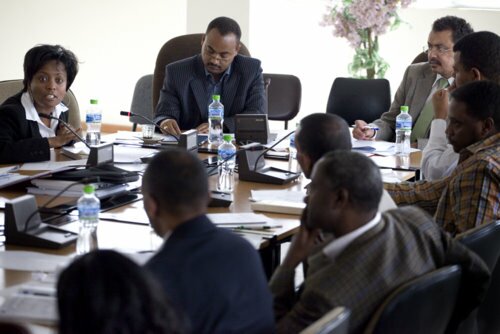The ongoing burden of 2,400 quarterly progress reports
 Photo Credit Dominic Chavez |
Development assistance for health -- aid that can boost a country’s social and economic development -- has risen dramatically in the past decade. But the increase in aid and the multiplying of donors has created a new, unwieldy, and largely fragmented funding landscape for recipient countries to navigate.
It is estimated that on average many developing countries receive over 800 new projects annually, host more than 1,000 monitoring missions, and prepare and present 2,400 quarterly progress reports. Because of this, donors frequently tout the importance of aid effectiveness or donor alignment these days. Yet on the ground, in developing country ministries of health, there is very little donor support for these efforts including improving a country's capacity to coordinate its donors. Greater aid effectiveness should be enough incentive for donors to invest more in ministry-based aid coordination systems. But that has not been the case.
MLI’s new publication, Improving Country Capacity for Aid Coordination, documents the different approaches the five MLI country ministries of health take in managing aid for greater effectiveness. In a questionnaire about aid coordination completed by the ministry of health in each MLI country, the inefficiency of many current aid coordination systems was cited.
This is not a new discussion. Recommendations to improve aid effectiveness, outlined in the Paris Declaration of 2005 and the Accra Agenda for Action of 2008, included five principles: country ownership, alignment, harmonization, managing for development results, and mutual accountability. Initiatives such as the International Health Partnership (IHP+) have been working to put these principles into practice.
Launched in September of 2007, IHP+ and partners share a common interest in improving health services and health outcomes by enacting Paris and Accra principles on aid effectiveness. IHP+ encourages “country compacts” between donors and governments with countries leading the way by using their national health strategy as the organizing framework for aid coordination. These compacts hold both parties mutually accountable for results.
MLI countries Ethiopia, Mali, and Nepal are already IHP+ countries and MLI has supported both Senegal and Sierra Leone to finalize their IHP+ compacts. Yet, other donor support to advance these efforts is limited. If donors want to see greater aid effectiveness, they must make stronger commitments to country ownership, strengthen ministry-based aid coordination units, and help countries build stronger systems to monitor and manage aid support.
Improving Country Capacity for Aid Coordination, now available online, offers a number of practical examples for ways that developing countries can turn global principles of aid effectiveness into greater results on the ground.
Keyword Search
MLI works with ministries of health to advance country ownership and leadership. This blog covers issues affecting the ministries and the people they serve.
Connect with Us
![]()
![]()
Categories
Blogs We Like
- Africa Can End Poverty
- Africa Governance Initiative
- Behind the Numbers
- CapacityPlus
- Center for Global Health R&D Policy Assessment
- Center for Global Development: Global Health Policy
- Center for Health Market Innovations
- Global Health
- Global Health Hub
- Global Health Impact
- The New Security Beat
- PAI Blog
- RH Reality Check
- Save the Children
- Transparency and Accountability Program
Contact Us
Please direct all inquiries to
